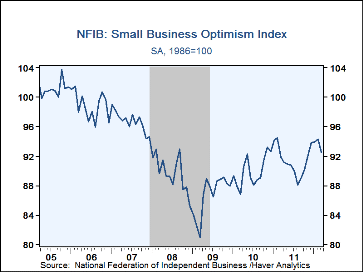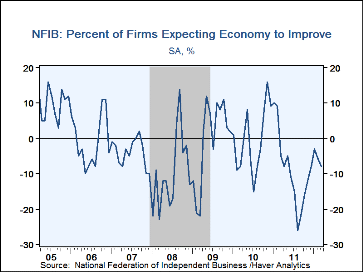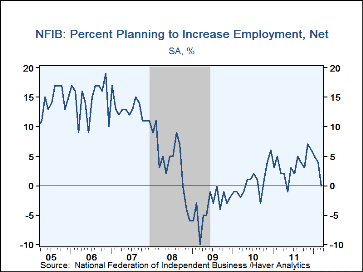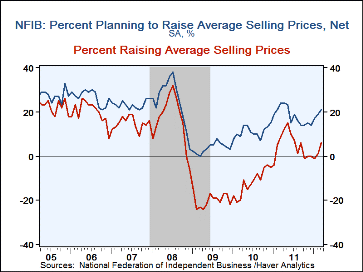 Global| Apr 10 2012
Global| Apr 10 2012U.S. Small Businesses Show Broad-based Concerns
by:Tom Moeller
|in:Economy in Brief
Summary
Small business optimism deteriorated last month. The National Federation of Independent Business reported that its Optimism Index fell to 92.5 in March from an unrevised 94.3 February. The latest was the lowest since November. [...]
Small business optimism deteriorated last month. The National Federation of Independent Business reported that its Optimism Index fell to 92.5 in March from an unrevised 94.3 February. The latest was the lowest since November. Underlying the deterioration was an across-the-board increase in pessimism. The percentage expecting the economy to improve fell to its lowest since November, so the percent of firms planning to raise employment dropped to zero, its least since last May. In addition, the percentage of firms expecting higher real sales in six months fell to its lowest since November. Moreover, the percentage reporting that credit was harder to get increased to its highest since August. Ironically, in an apparent attempt to bolster top-line revenues, the percentage of firms lifting prices rose to its highest since July and the percent planning to raise prices was its highest May.
The most important problems faced by small business were poor sales (22%), taxes (20%), government requirements (19%), inflation (9%), competition from large businesses (7%), insurance cost /availability (6%), quality of labor (6%), cost of labor (4%) and financial & interest rates (3%).
Roughly 24 million small businesses exist in the U.S. and they create 80% of all new jobs. The NFIB figures can be found in Haver's SURVEYS database.
| National Federation of Independent Business | Mar | Feb | Jan | Mar'11 | 2011 | 2010 | 2009 |
|---|---|---|---|---|---|---|---|
| Small Business Optimism Index (SA,1986=100) | 92.5 | 94.3 | 93.9 | 91.9 | 91.4 | 89.9 | 86.7 |
| Firms Expecting Higher Real Sales In Six Months (Net %) | 8 | 12 | 10 | 6 | 3 | 1 | -11 |
| Firms Expecting Economy To Improve (Net %) | -8 | -6 | -3 | -5 | -9 | -1 | -0 |
| Firms With One or More Job Openings (Net %) | 15 | 17 | 18 | 15 | 14 | 10 | 9 |
| Firms With Few or No Qualified Applicant For Job Openings (Net %) | 32 | 31 | 31 | 29 | 32 | 27 | -- |
| Firms Reporting That Credit Was Harder To Get (Net %) | 11 | 8 | 8 | 8 | 10 | 13 | 14 |
| Firms Raising Avg. Selling Prices(Net %) | 6 | 1 | -1 | 9 | 5 | -12 | -20 |
Tom Moeller
AuthorMore in Author Profile »Prior to joining Haver Analytics in 2000, Mr. Moeller worked as the Economist at Chancellor Capital Management from 1985 to 1999. There, he developed comprehensive economic forecasts and interpreted economic data for equity and fixed income portfolio managers. Also at Chancellor, Mr. Moeller worked as an equity analyst and was responsible for researching and rating companies in the economically sensitive automobile and housing industries for investment in Chancellor’s equity portfolio. Prior to joining Chancellor, Mr. Moeller was an Economist at Citibank from 1979 to 1984. He also analyzed pricing behavior in the metals industry for the Council on Wage and Price Stability in Washington, D.C. In 1999, Mr. Moeller received the award for most accurate forecast from the Forecasters' Club of New York. From 1990 to 1992 he was President of the New York Association for Business Economists. Mr. Moeller earned an M.B.A. in Finance from Fordham University, where he graduated in 1987. He holds a Bachelor of Arts in Economics from George Washington University.
More Economy in Brief
 Global| Feb 05 2026
Global| Feb 05 2026Charts of the Week: Balanced Policy, Resilient Data and AI Narratives
by:Andrew Cates










